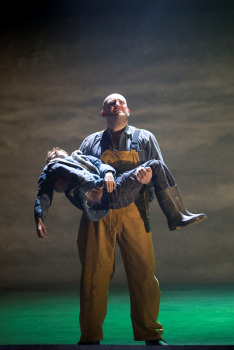|
Editorial Board
Melanie
Eskenazi
Webmaster: Len Mullenger
|
Seen and Heard Opera Review
Britten, Peter Grimes - Opera North at Sadler's Wells: soloists, chorus and orchestra of Opera North conducted by Richard Farnes, Phyllida Lloyd (director) Anthony Ward (set and costume designer) 23.11. 2006 (JPr)
 This new staging by Phyllida Lloyd was reviewed recently when it visited Manchester (Review here.)Meanwhile just a reminder of what a ‘homecoming’ this was, as Opera North fresh from their refurbishment of their base at the Grand Theatre in Leeds bring Peter Grimes to the site of its première over 60 years ago on 7 June 1945. John Lucas’s book Reggie, about the conductor Reginald Goodall who conducted that first performance, recalls:
‘The first night … took place amid great nervousness from everyone, including Guthrie [administrator of the opera company at Sadler’s Wells]. “Whatever happens,” he said to Joan Cross [the first Ellen Orford]), shortly before curtain up, “we were absolutely right to do this piece.” Guthrie worried that the theatre’s central chandelier, back in place for the first time since the air-raids, might come crashing down on the heads of the musical world assembled in the stalls below – Ralph Vaughan Williams, Sir George Dyson, William Walton, Michael Tippett, John Christie of Glyndebourne, Yehudi Menuhin (in Britain to give concerts for American forces), Albert Coates. The house was sold out, “with more evening clothes and fur wraps than have been seen in the theatre since the war began”. … Britten (“a young man with disordered hair”, reported the News Chronicle the next day) paced up and down at the back off the stalls during the performance. He was too nervous to sit down.’
There was no risk of any chandelier falling on this occasion, as that disappeared in Sadler’s Wells own renovation at the end of last century, but there were some of the ‘great and good’ in attendance, even if there were almost as many evening suits as t-shirts and jeans and certainly no fur that I could see!
The Borough was the name of George Crabbe’s 1810 poem which inspired this opera by Britten and his librettist, Montagu Slater. My only qualm is whether this albeit very powerfully dark evocation of the outsider (Grimes) hounded to death by the seaside community (‘Borough’) which reeks of hypocritical self-righteousness deserved the title ‘staging’. It is in truth no more than an elaborate semi-staging by Phyllida Lloyd abetted by Anthony Ward’s minimalist designs and eclectic mix of fairly modern ‘off the charity-shop rail’ costumes. Against a painted screen of a grey sea and with little more than a few wooden palettes, a large net suspended like a circus tent, a large cross, some chains and a tower everything is hinted at from the sea, to the pub, church and Peter Grimes’s hut.
This does not rate highly in the list of my favourite operas, mainly because I am not certain that it is not implied that Grimes is indeed guilty of the death of his apprentices. Also, while Richard Wagner is never left alone by the academics because in their view a composer must always include his private thoughts in his works, here we are supposed to suspend belief that not everything associated from the lives of Britten or his life-partner, Peter Pears (the first Grimes), ever gets into this opera. Of course it is easy to say yes, they are there as ‘outsiders’ in a world were homosexuality was illegal, there is the intrusion by community of others into their private lives when theirs are probably no better themselves, but I may be naïve but I have always had problems with the young children and the abuse they suffer in this opera.
Phyllida
Lloyd washes this all out to sea by making Grimes seemingly
innocent of all the deaths and putting the boy’s ‘cliff
fall’ we witness firmly as the result of the community
pounding on Grimes’s door. Just before this Lloyd is content
to make the artifice of the stage only too apparent and
is disinclined to let (as during the other ‘sea intervals’)
the music talk for itself. The Passacaglia is spoilt
by the erection of that tower supposedly representing
Grimes’s cliff top hut and it is only too clear that a
safety wire is clipped onto the belt of his apprentice
(Aaron Eastwood) before he flies to his ‘death’. Whatever
happened to the magic of the theatre?
Picture © Bill Cooper Back to the Top Back to the Index Page |
| ||
|
||||


